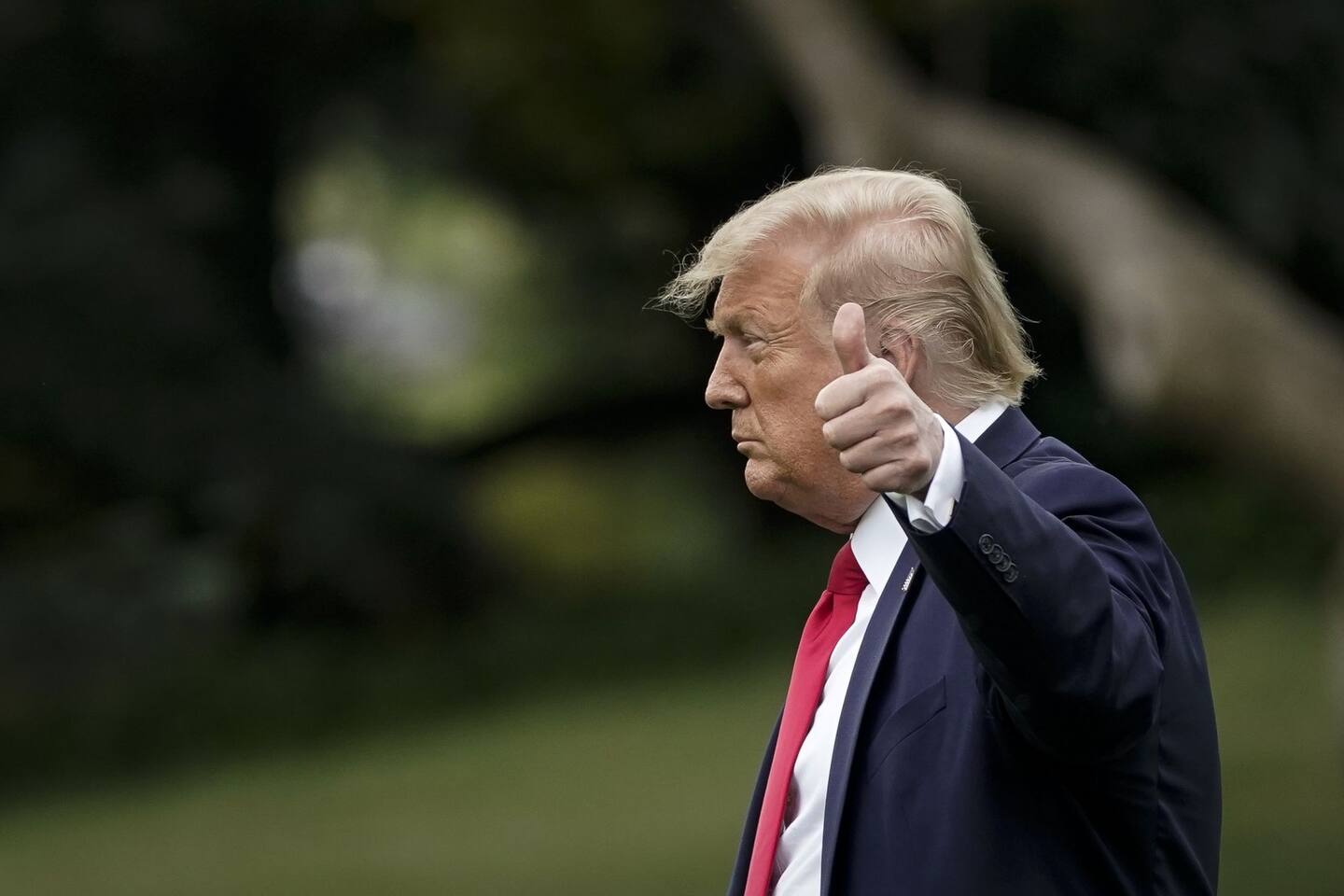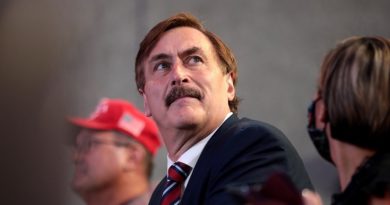Trump’s impeachment attorneys offer a laughable rationalization for his false fraud claims

As expected, the document’s evaluation of Trump’s actions surrounding the violent invasion of the U.S. Capitol on Jan. 6 includes a defense of his claims that the 2020 presidential election was marred by voter fraud.
This assertion from Trump — a constant drumbeat offered from the hours after polls closed on Nov. 3 until the morning of Jan. 6 itself — was the primary trigger for the events of the day. Without Trump’s insistences that he’d won the election when he hadn’t, without his efforts to cast various others as obstacles to his serving a second term in office, there’s no rally at the White House that morning and no crowd of people milling around who would then overrun the Capitol. Had Trump simply accepted his loss and telegraphed it to his base, there would have been frustration and anger. But instead, he continually claimed that the election was being stolen, elevating a truly breathtaking litany of allegations, never stopping to assess their credibility but simply pushing them forward, one man tossing empty sandbags in front of the tsunami of reality.
The article of impeachment passed by the House the week after the insurrection at the Capitol leveraged his Jan. 6 speech as the moment of incitement. It also cited those months of falsehoods about the election, coupled with falsehoods about the ability of Congress or Vice President Mike Pence to overturn his loss as additional factors.
The response from Trump’s (newly designated) legal team? A two-pronged attempt to minimize Trump’s obvious actions.
“It is admitted that after the November election, the 45th President exercised his First Amendment right under the Constitution to express his belief that the election results were suspect,” the brief reads, “since with very few exceptions, under the convenient guise of Covid-19 pandemic ’safeguards’ states election laws and procedures were changed by local politicians or judges without the necessary approvals from state legislatures.”
“Insufficient evidence exists upon which a reasonable jurist could conclude that the 45th President’s statements were accurate or not,” it continues, “and he therefore denies they were false.”
Later, it specifically argues that his speech at the White House on the morning of Jan. 6 similarly was a reflection of his First Amendment rights.
So the two arguments being made here, both of which are terrible, are that Trump was simply exercising free speech in repeatedly claiming that the election was stolen and, second, that the sanctity of the election is unknowable.
The first point is easily dismissed by anyone who has spent more than five minutes considering the First Amendment and its history. By now, your brain should be jumping up and down hollering “Fire in a crowded theater!” for the very good reason that this commonly known (though often misunderstood) scenario serves as a reminder of how the First Amendment is necessarily limited.
In 1969, the Supreme Court articulated a specific exception to the broad right of free speech: “The constitutional guarantees of free speech and free press do not permit a State to forbid or proscribe advocacy of the use of force or of law violation except where such advocacy is directed to inciting or producing imminent lawless action and is likely to incite or produce such action.”
In other words, speech that incites or is likely to incite lawless action is exempted from the First Amendment. Sort of a flaw in using the First Amendment to defend speech alleged to have incited lawless action.
Impressively, it’s the second argument here, the one about “fraud” itself, that is the worse one.
Trump’s attorneys do two dishonest things one after the other. Trump, they claim, thought that “the election results were suspect” because “under the convenient guise of Covid-19 pandemic ’safeguards’ states election laws and procedures were changed by local politicians or judges without the necessary approvals from state legislatures.”
You may notice that one doesn’t follow from the other. State voting laws were changed and … therefore the results were suspect?
What the attorneys are doing, in fact, is conflating two separate lines of argument made by Trump and his allies after the election. The first line of argument offered that the election was incorrectly administered and that, as a result, huge numbers of votes should be thrown out. The second line of argument was that there was rampant fraud undercutting the reliability of the results. The first argument was an attempt to use the law to simply overturn the election, and when it was presented to various courts, it was rejected. The second argument was a claim about rampant coordinated illegality for which there was never any credible evidence presented.
In other words, the attorneys are claiming that what Trump spent weeks alleging — that there was rampant fraud — was instead an argument about the legality of state voting processes. They’re trying to cloak his incendiary and dishonest assertions in the garb of legal consideration and debate. It’s a ridiculous effort easily undone by, say, searching Trump’s tweets from after the election for the word “fraud.” Not a lot of them expressed concern about the mechanisms used to change voting laws.
What’s more, the claim about laws being changed doesn’t stand on its own. The most commonly cited change to the law in a swing state was Pennsylvania’s expansion of mail voting. This was the shift that Sen. Josh Hawley (R-Mo.) used as his rationale for objecting to the counting of electoral votes from that state in the hours after the insurrection. But this wasn’t local politicians changing the rules under the pretext of the coronavirus pandemic. It was, instead, a law passed by the Republican majority in the state months before the pandemic began.
Some, including Hawley, have argued that the law violates the state’s constitution, but after the 2020 presidential election, the chief justice of the state’s Supreme Court wrote that this question shouldn’t affect the millions of votes cast under the new law, since there was no indication that those votes hadn’t been cast by Pennsylvanians in good faith. In other words, the chief justice explicitly broke the connection Trump’s attorneys try to make between how voting laws changed and the results allegedly being suspect.
Then there’s that sentence that should be a midterm exam question for a first-year philosophy course.
“Insufficient evidence exists upon which a reasonable jurist could conclude that the 45th President’s statements were accurate or not,” the attorneys write.
Imagine for a moment that the statements being referred to in that sentence were claims that Martians had built an enormous, invisible city that hovers one mile above Pikes Peak and that realigns itself as needed so that planes or birds don’t hit it. You cannot provide sufficient evidence to debunk this assertion, because it, like the city itself, can simply be warped around any counterpoint you raise. This is why the burden of proof for rhetorical claims falls on the person making the claim. It is not up to the world to prove Trump’s fraud claims false; it is up to him to prove them true. Which, after several months, he’s been completely unable to do.
Again, though, even this assertion is ridiculous. There is enormous evidence allowing someone to conclude that Trump’s statements about fraud are false. For example, there have been several audits and recounts validating the results of the vote. There have been examinations of fraud claims, which have led to their being dismissed. There have been investigations of suspect votes.
If the police scour a bank and find no money missing, no windows broken, nothing unusual on the surveillance cameras and no assertions from employees that they saw anything illegal happen, the police have good cause to assume that the bank was not robbed and evidence bolstering that assumption.
There is a real debate to be had over the extent to which Trump deserves immediate blame for the violence at the Capitol. There is no serious debate, though, over the fact that Trump consistently misled his base about the results of the election and never offered any credible evidence to support his claims that it was stolen. There is no debate that his insistence that he won the election led to a huge crowd of people showing up in D.C. on Jan. 6.
Lawyers are paid to make the best case they can for their clients. If this is Trump’s best case, he’s lucky that nearly half the jurors who will evaluate it are already firmly in his camp.


